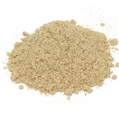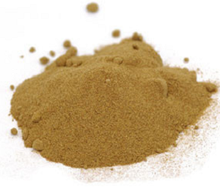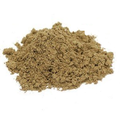 Loading... Please wait...
Loading... Please wait...- Home
- Bulk Herbs
- Herbs (J-L)
- Juniper Berry Powder
Product Description
Juniper Berry, Powder
Wild Crafted USA
Also Known As –Juniperus communis
Overview - Juniper is a slow-growing evergreen tree. It can be grown in many parts of the world. The tree produces hard berries that are then harvested for many uses. The berries are not "true" berries, but scales from the tree's cones.
Medicinal Uses – Internally, Juniper can help keep the kidneys flowing and it is useful for prolapsed or weakness of the bladder and urethra. The herb stimulates the body systems, so it is often used for people who are debilitated. It is often recommended for gout, rheumatoid arthritis, joint pain, as well as muscle, nerve and tendon problems. It can be taken both internally and used topically for these ailments. It is used to regulate menstrual cycles and to bring on bleeding. It is an abortifacient, so it should not be used during pregnancy. It is an excellent herbal remedy to relieve gastric distress. Externally, Juniper can be used topically for joint pain, arthritis, gout and muscle and tendon pain. The oil can be applied to the chest for coughs and lung congestion.
Other Uses - Juniper berries are used to flavor gin. It is also used sometimes in cooking for seasoning. In ancient Egypt, the oil was used in the mummification process.
Parts Used - The berries are the only portion that are used medicinally. They can be dried or distilled to create essential oil.
Herbs to Combine/Supplement - Juniper can be combined with ginger and other herbs for joint pain, and taken for a month. You need to take a break from the medication for about a week or ten days, and then you may begin the herbal remedy again.
Precautions - Excessive use of juniper may cause kidney irritation. People suffering from kidney disorders should not take it, or use it with caution under the care of a qualified herbalist. There is some controversy if the irritation factor with kidneys is due to the juniper itself or adulterated products. Either way, err on the side of caution. Do not take continuously for longer than four weeks without the consultation of an experienced healthcare professional.
- There are some reports that suggest juniper may raise blood sugar levels, so diabetics should exercise caution. Do not apply the pure essential oil to the skin, as it may cause a rash. Make sure the essential oil is generously diluted into a carrier oil like jojoba or almond before application. Pregnant women should avoid the herb, as it may cause contractions. If you take prescription medications, check with your pharmacist or care provider to find out if this herb will interact with any of them before you begin taking this herb..
Suggestions - Dried berries – 1-1/2 to 2 teaspoons can be taken daily. For tea, add 1 teaspoon of dried berries to 1 cup boiling water and steep them for 20 minutes in a covered container to retain the volatile oils. One cup of this herbal tea can be taken in the morning and evening. When juniper is combined into tablets or capsules with other herbs, 1 to 2 grams can be taken three times per day or 1 to 2 ml of tincture can be taken three times per day.
Disclaimer - The information presented herein by Mountain Maus’ Remedies is intended for educational purposes only. These statements have not been evaluated by the FDA and are not intended to diagnose, cure, treat or prevent disease. Individual results may vary, and before using any supplements, it is always advisable to consult with your own health care provider.
















